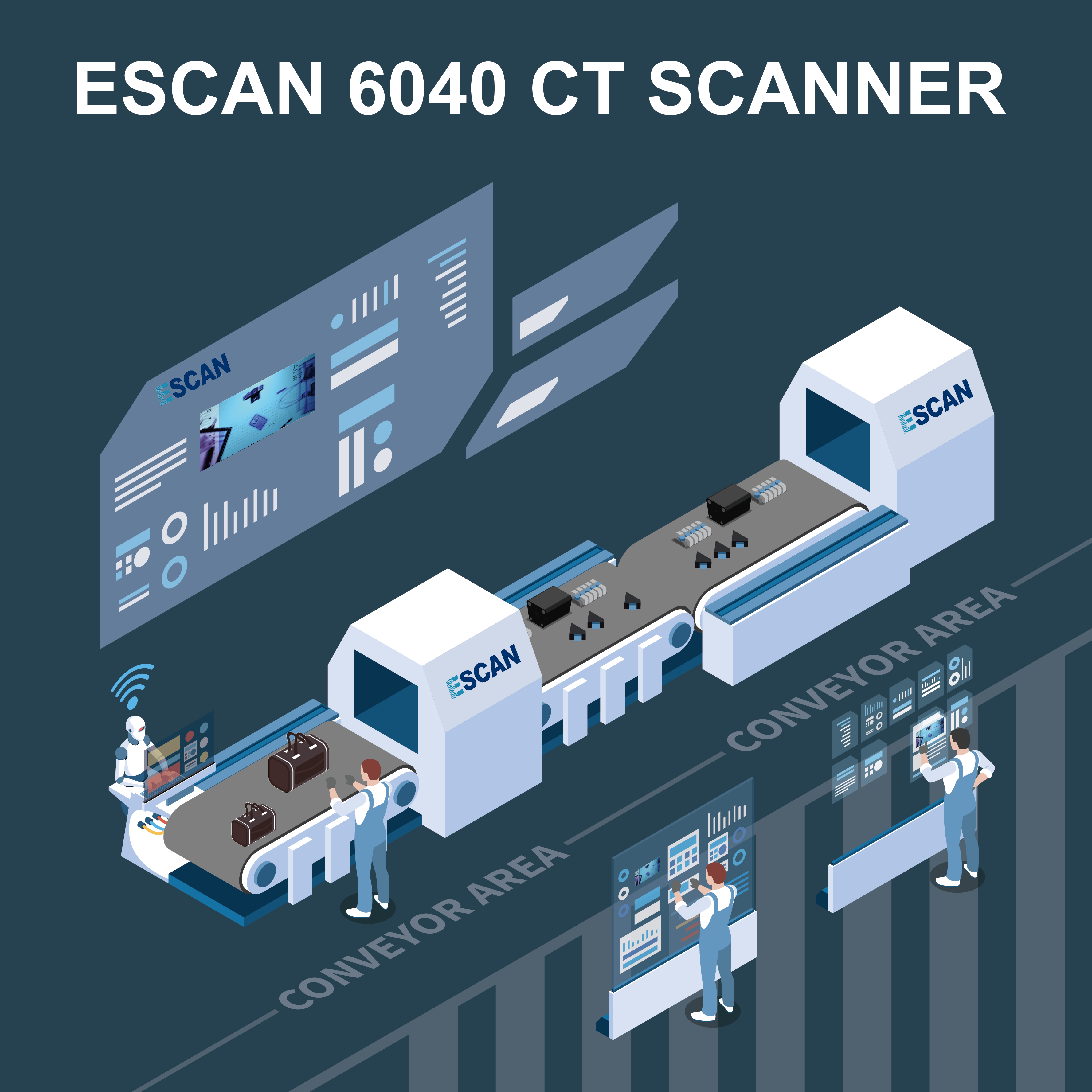CT X-ray baggage scanner, I'm sure you are not unfamiliar with it, it has become a necessary facility in stations and airports, X-ray inspection is often used for baggage security scannings, such as airport check-in and hand baggage inspection. Since it is common in life, we are not unfamiliar with its external structure, like motor, touch panel, RS-232, etc. This time, we mainly focus on its internal-core analysis
Here is the content list:
l DSP processor of CT X-ray baggage scanner
l Amplifier for CT X-Ray Baggage Scanners
l Converter for CT X-ray baggage scanner
l Human Power Management for CT X-ray Baggage Scanners
l Temperature Sensor for CT X-Ray Baggage Scanners
DSP processor of CT X-ray baggage scanner
DSP processor can be used for imaging reconstruction, using the signal received from the image detector surface array to generate images of scanned items
① High-performance single-core DSPs.
TMS320C6452: The highest performance fixed-point digital signal processor
A C64x+ DSP with up to 7.2 billion per second (MIPS) instruction performance at a clock rate of 900 MHz, the DSP core has the operational flexibility of a high-speed controller and the numerical capability of an array processor. The device also features dedicated hardware logic, on-chip memory, and additional on-chip peripherals similar to those found in other C6000 DSP platforms. The core uses a two-level cache architecture with programmable interrupt/event generation modes, multiplexing, and other external
② Multicore DSPs
TMS320C6474: Multi-core digital signal processor
Based on the third generation of high-performance, advanced VelociTI Texas Instruments-developed Very Long Instruction Word (VLIW) architecture
③ ARM9, programmable DSP
TMS320DM6446: Da Vinci Digital Media System-on-Chip
Leverages TI's DaVinci technology to meet the needs of next-generation embedded devices for networked media encoding and decoding application processing.
Amplifier for CT X-Ray Baggage Scanners
Amplifiers to amplify the low to mid-frequency signals from the image detector facet array used for ADCs require the use of ultra-low current and noise amplifiers. These are typically the limiting components to achieve the wide dynamic range required. Because signal amplitudes vary, a low-noise mutual impedance amplifier (TIA) is usually required
① Low Noise Amplifiers
OPA211: Low Noise, Low Power, Precision Op Amps.
This family of precision op amps achieves a supply current of 3.6 mA and very low noise density. It also provides rail-to-rail output swing, thus maximizing dynamic range. Thanks to its ability to provide 700ns of build-up time with 16-bit accuracy across the entire 10V output swing. Combined with an offset of only 125μV and temperature drift of 0.35μV/°C, this makes it suitable for driving high precision 16-bit ADCs or buffered high-resolution output DACs.
② Fully Differential Amplifier
THS4130: Fully differential input/output low-noise amplifier with shutdown function
③ Voltage feedback amplifier
OPA2835 (Chinese data): Dual, ultra-low power, rail-to-rail output, negative rail input, VFB amplifier.
Converter for CT X-ray baggage scanner
① Δ-sigma type ADCs typically have integrated current-to-voltage (I-to-V) conversion, which can be used to convert low-level currents into data information to be processed by computing components.
(ii) When a separate front-end amplifier provides current-to-voltage (I-to-V) conversion, a voltage input ADC is usually required.
(iii) Also DACs are the most commonly used to create base receive ADCs for arrays
ADS5263: Quad 16-bit, 100MSPS 84.6dB SNR ADC
Using CMOS process technology and innovative circuitry techniques, this device is designed to operate at low power consumption and provide extremely high SNR performance at 4 Vpp full-scale input. It also includes an averaging mode in which two channels (or four channels) can be averaged to improve SNR and a programmable mapper module that enables flexible mapping between input channels and LVDS output pins. This helps to greatly reduce the complexity of LVDS output path selection and has the potential for cheaper system boards by reducing the number of layers of the printed circuit board.
Human Power Management for CT X-ray Baggage Scanners
For the acquisition system to control the system power
① DC / DC controller (external switch)
TPS40054: Wide input (8 V to 40 V) up to 1 MHz synchronous buck controller for use as a source controller only. This device is part of a family of high voltage, wide input (8 V to 40 V), synchronous, buck controllers that provide design flexibility with a variety of user-programmable features including soft start, Undervoltage lockout, operating frequency, voltage feedforward, high side current limit, and loop compensation. The voltage feedforward control technology is also used to provide good line regulation over a wide input voltage range and fast response to input line transients.
② Monitoring Circuit (Voltage Monitor)
TPS3103E12: Ultra-Low Supply Current / Supply Voltage Monitoring Circuit.
③ Step-Down Regulators
TPS54310: Low Input Voltage 3A Synchronous Buck Converter with Adjustable Output Voltage.
Temperature Sensor for CT X-Ray Baggage Scanners
Often there are multiple channels in a system that cause the ambient temperature in the system to rise, thus requiring fan-controlled cooling.
① Temperature monitoring and fan control
AMC6821: Temperature monitoring and fan control
An intelligent temperature monitor and pulse width modulation (PWM) fan controller. Designed for noise-sensitive or power-sensitive applications that require an active cooling system. Using a low or high-frequency PWM signal, the device is capable of simultaneously driving a fan, monitoring the temperature of a remote sensor diode, and measuring and controlling the fan speed to operate at the lowest possible speed with the least noise.
② Temperature Sensor
TMP421: ±1°C Remote and Local Temperature Sensor in SOT23-8 Package.
Nowadays, CT X-ray baggage scanners have become an essential device to ensure traffic safety and eliminate safety hazards, and their functions are becoming more and more comprehensive and their performance is becoming more and more perfect.

















